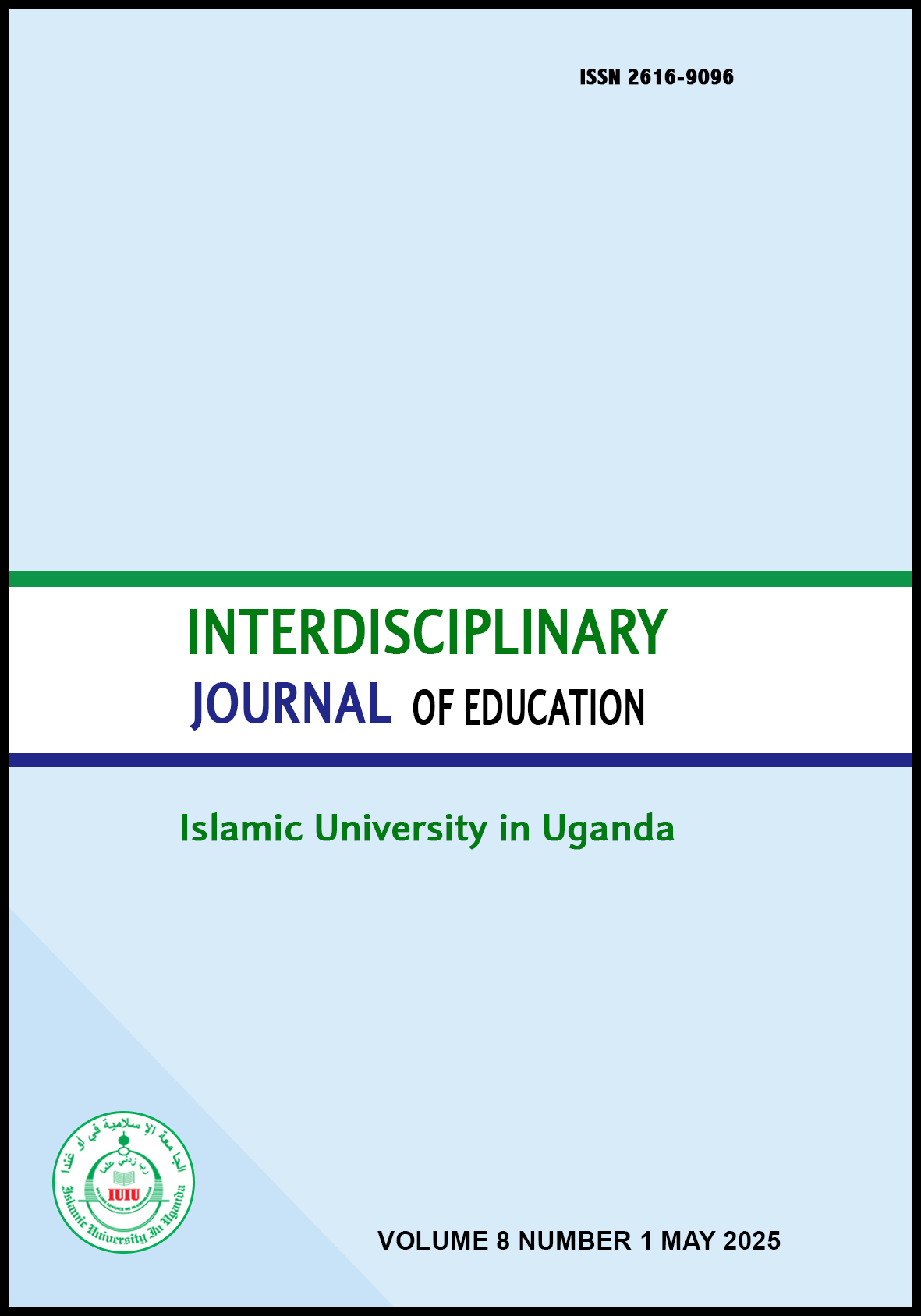Predictors of Psychological Well-Being Among Students at Islamic University in Uganda
DOI:
https://doi.org/10.53449/d7sgd082Keywords:
psychological well-beingAbstract
This study investigates the relationship between social support, religious commitment, and resilience, and their predictive value for psychological well-being among undergraduate students at the Islamic University in Uganda (IUIU), Main Campus. A cross-sectional survey of 345 students was conducted using validated scales: the Multidimensional Scale of Perceived Social Support, the Religious Commitment Inventory-10, the Brief Resilience Scale, and the Psychological Well-being Scale. Descriptive analyses characterized the sample, and multiple regression tested the independent contributions of each predictor. Results indicated that social support (β = .370, p < .001), resilience (β = .287, p < .001), and religious commitment (β = .176, p < .001) each significantly and uniquely predicted psychological well‑being, together accounting for 48.3% of the variance (R² = .483). The findings underscore the importance of fostering supportive networks, spiritual engagement, and resilience skills to promote student mental health in university settings. It is therefore recommended that various stakeholders in the University such as administrators, counsellors, Da’awah Committee (Council of religious affairs), and students’ leaders should develop appropriate programmes that provide social support, enhance religious commitment, and cultivate resilience to increase students’ ability to cope with the problems of psychological well-being.
Downloads
References
Acharya, L., Jin, L., & Collins, W. (2018). College life is stressful today – Emerging stressors and depressive symptoms in college students. Journal of American College Health, 66(7), 655–664. https://doi.org/10.1080/07448481.2018.1451869
Creswell, J.W. & Creswell, J.D. (2018). Research design: Qualitative, quantitative, and mixed methods approaches. SAGE Publications.
Hobfoll, S. E. (1989). Conservation of resources: A new attempt at conceptualizing stress. American Psychologist, 44(3), 513–524.
Hynie, M. (2018). The social determinants of refugee mental health in the post-migration context: A critical review. Canadian Journal of Psychiatry, 63(5), 297–303. https://doi.org/10.1177/0706743717746666
Kaggwa, M. M., Arinaitwe, I., Kawuki, J., Nkola, R., Muwanguzi, M., Sserunkuma, J., ... & Atim, L. M. (2021). Suicide among Ugandan university students: Evidence from media reports for 2010–2020. Behavioral Sciences, 11(5), 64. https://doi.org/10.3390/bs11050064
Kaggwa, M. M., Kajjimu, J., Ainamani, H. E., & Bongomin, F. (2023). Depression and associated factors among university students in Uganda during COVID-19 lockdown: A cross-sectional study. PLOS ONE, 18(1), e0281084. https://doi.org/10.1371/journal.pone.0281084
Masten, A. S. (2018). Resilience theory and research on children and families: Past, present, and promise. Journal of Family Theory & Review, 10(1), 12–31. https://doi.org/10.1111/jftr.12255
Nalugya-Sserunjogi, J., Rukundo, G. Z., Ovuga, E., Kiwuwa, M. S., & Musisi, S. (2016). Prevalence and factors associated with depression symptoms among school-going adolescents in Central Uganda. Child and Adolescent Psychiatry and Mental Health, 10, 39. https://doi.org/10.1186/s13034-016-0133-4
Nasir, R., Muhamad, M. S., & Farid, N. D. N. (2022). Religious commitment and psychological well-being among Muslim youth: A review. Malaysian Journal of Medical and Health Sciences, 18(1), 219–226.
Ng, S. M., Yau, T. K., & Chan, C. L. (2021). An evaluation of the effectiveness of a mindfulness-based psychoeducation group program for people with psychological distress in Singapore. Asia-Pacific Psychiatry, 13(3), e12440. https://doi.org/10.1111/appy.12440
Rassool, G. H. (2015). Cultural competence in counseling the Muslim patient: Implications for mental health. Archives of Psychiatric Nursing, 29(5), 321–325. https://doi.org/10.1016/j.apnu.2015.06.011
Ryff, C. D., & Keyes, C. L. M. (1995). The structure of psychological well being revisited. Journal of Personality and Social Psychology, 69(4), 719–727. https://doi.org/10.1037/0022-3514.69.4.719
Sibley, C. G., Greaves, L. M., Satherley, N., Wilson, M. S., Overall, N. C., Lee, C. H. J., ... & Barlow, F. K. (2020). Effects of the COVID-19 pandemic and nationwide lockdown on trust, attitudes toward government, and well-being. American Psychologist, 75(5), 618–630. https://doi.org/10.1037/amp0000662
Smith, B. W., Dalen, J., Wiggins, K., Tooley, E., Christopher, P., & Bernard, J. (2008). The Brief Resilience Scale: Assessing the ability to bounce back. International Journal of Behavioral Medicine, 15(3), 194–200. https://doi.org/10.1080/10705500802222972
World Health Organization. (2020). Mental health and psychosocial considerations during the COVID-19 outbreak. https://www.who.int/docs/default-source/coronaviruse/mental-health-considerations.pdf
Worthington, E. L., Jr., Wade, N. G., Hight, T. L., Ripley, J. S., McCullough, M. E., Berry, J. W., & O’Connor, L. (2003). The Religious Commitment Inventory–10: Development, refinement, and validation of a brief scale for research and counseling. Journal of Counseling Psychology, 50(1), 84–96. https://doi.org/10.1037/0022-0167.50.1.84
Zimet, G. D., Dahlem, N. W., Zimet, S. G., & Farley, G. K. (1988). The Multidimensional Scale of Perceived Social Support. Journal of Personality Assessment, 52(1), 30–41. https://doi.org/10.1207/s15327752jpa5201_2
Downloads
Published
Issue
Section
License

This work is licensed under a Creative Commons Attribution-NoDerivatives 4.0 International License.








